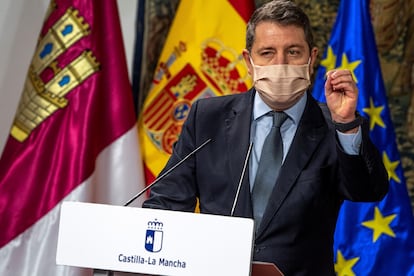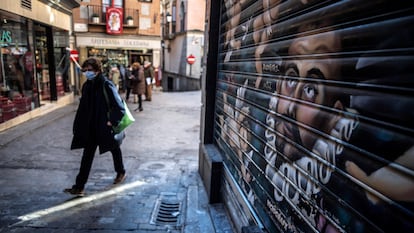Andalusia, Castilla-La Mancha to introduce new coronavirus restrictions
Scores of municipalities will be sealed off to everything but essential travel as new cases continue to climb

Two Spanish regions on Monday announced tough new restrictions on mobility as coronavirus infections continued to climb to new highs. On Monday afternoon the Health Ministry reported 84,287 new infections since Friday, the biggest weekend increase since the beginning of the pandemic.
In the southern region of Andalusia, all provincial capitals except for Seville and Jaén will be under a perimetral lockdown. This adds to a growing list of municipalities under severe restrictions due to a 14-day cumulative incidence rate of over 500 cases per 100,000 people, considered an extreme risk scenario. In locations where the incidence rate is above 1,000, all non-essential businesses are also being forced to close.
Starting on Wednesday, a total of 326 Andalusian municipalities will be sealed and residents will only be allowed out on essential trips, said the news agency Europa Press, citing regional health department figures. Of these, 144 will also see all non-essential businesses shut down.
On Monday, the city of Málaga and seven other major locations in the same-name province had an incidence of over 500. These include the popular destinations of Benalmádena, Mijas, Fuengirola, Estepona and Marbella, which also stand to be placed under a perimetral lockdown, the regional daily Diario Sur reported. The move has yet to be published in the regional official gazette, the BOJA. The restrictions are due to go into effect on the night of Tuesday to Wednesday and last at least 14 days.
Until Friday, Almería was the only provincial capital with an incidence rate of over 500. But Andalusia’s rate has doubled in just one week to reach a regional average of over 625 cases per 100,000. “Contagions in Andalusia, Spain and the rest of the world have multiplied at an alarming rate,” said Andalusian premier Juanma Moreno, of the Popular Party (PP), at a news conference on Friday.
Castilla-La Mancha confinements

The government of Castilla-La Mancha, a large central region that includes the province of Toledo, announced that every one of its more than 900 municipalities is being confined, and residents may only exit or enter on essential business.
Additionally, the overnight curfew will now start at 10pm, and social venues are shutting down, including bars and restaurants, day centers, shopping centers, betting parlors, social clubs, gyms, museums, theaters and cinemas. The restrictions will remain in place for at least 10 days, said government officials.
“These decisions are not easy or pretty. They are bitter,” said Castilla-La Mancha premier Emiliano García-Page, of the Socialist Party (PSOE), at a news conference where he also urged the central government to take action rather than leave all coronavirus policy in the hands of the regions. “The advantage of having a single strategy in Spain is greater than any ideology or distribution of power. Citizens of Spain need to know that the same measures are applying everywhere,” he said. “A unified message is a determining factor in fighting the virus.”
As for the stringent new measures announced in the region, García-Page said that “we want mobility to be reduced to the bare minimum: work, school, essential services. We need to deliver an electric shock to the virus. Our hospitals are not at the breaking point, but we are starting to feel the pressure.”
New legal tools
On Monday afternoon, Murcia authorities were the latest to ask for changes to the wording of the state of alarm approved by parliament in late October and due to expire in May. Like other regions before it, Murcia wants to be allowed to start the overnight curfew earlier than the current established window of 10pm to midnight, and it also wishes to issue stay-at-home orders in municipalities or larger areas with very high incidence rates.
Faced with growing complaints by regional governments, central authorities said they are willing to discuss an earlier curfew at an upcoming meeting of health officials on Wednesday. The issue has already led to a legal standoff with the government of Castilla y León, which has unilaterally decreed an 8pm curfew in a region that includes major cities such as Segovia, Ávila, Burgos and Valladolid.
English version by Susana Urra.
Tu suscripción se está usando en otro dispositivo
¿Quieres añadir otro usuario a tu suscripción?
Si continúas leyendo en este dispositivo, no se podrá leer en el otro.
FlechaTu suscripción se está usando en otro dispositivo y solo puedes acceder a EL PAÍS desde un dispositivo a la vez.
Si quieres compartir tu cuenta, cambia tu suscripción a la modalidad Premium, así podrás añadir otro usuario. Cada uno accederá con su propia cuenta de email, lo que os permitirá personalizar vuestra experiencia en EL PAÍS.
¿Tienes una suscripción de empresa? Accede aquí para contratar más cuentas.
En el caso de no saber quién está usando tu cuenta, te recomendamos cambiar tu contraseña aquí.
Si decides continuar compartiendo tu cuenta, este mensaje se mostrará en tu dispositivo y en el de la otra persona que está usando tu cuenta de forma indefinida, afectando a tu experiencia de lectura. Puedes consultar aquí los términos y condiciones de la suscripción digital.









































